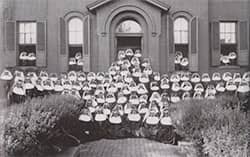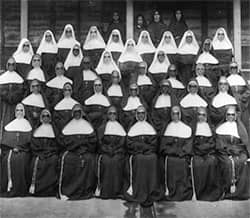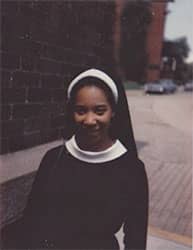:::page break:::
In the case of the Baltimore-based Oblate Sisters of Providence (1828-present), and the New Orleans-based Sisters of the Holy Family (1842-present), both congregations were founded in cities that contained two of the nation's largest slave markets, where nude and partially nude black bodies were abused, displayed, and sold on the auction block on a daily basis.
 |
| Group Photo of the Oblate Sisters of Providence at St. Frances Convent in Baltimore, MD, 1929 Courtesy of the Archives of the Oblate Sisters of Providence |
Unsurprisingly then, some of the earliest black nuns in the U.S. (several of whom were slaves, ex-slaves, or slave descendants) illegally taught free and enslaved black children and established some of the nation's earliest Catholic schools, orphanages, and nursing homes open to African Americans. After the Civil War, the Holy Family Sisters went so far as to seek the spiritual recovery of several sites in New Orleans associated with the sins of racism, slavery, and the sexual exploitation of black women and girls. Between 1870 and 1900, the order purchased several properties, including a former slave traders' pen and the French Quarter's infamous Orleans Ballroom, and transformed them into some of the congregation's earliest schools and administrative headquarters.
 |
| Photo of Several Sisters of the Holy Family at their Motherhouse in the French Quarter, New Orleans, LA, c. 1899 Library of Congress Prints and Photographs Division Washington, D.C. 20540 |
Following the liberalizing reforms of the Second Vatican Council, black sisters emerged from their convents ready to challenge the barriers that had long blocked their full and equal participation in their Church. Those in historically white and European orders in particular began to testify publicly about the racist abuses to which they had long been subjected and were still enduring in their congregations.
In 1968, 155 of the approximately 1,000 black Catholic sisters living and laboring in the United States, including two representatives from Uganda and Kenya, established the National Black Sisters' Conference (NBSC) in Pittsburgh, Pennsylvania to protest racism and sexism in the Church and wider society. Organized by 25-year-old Sister M. Martin de Porres (Patricia Muriel) Grey, Pittsburgh's first black Religious Sister of Mercy and the only woman present at the founding meeting of the Black Catholic Clergy Caucus, the conference marked the first time that black sisters had met on a unified stage in their 156-year-old history in the U.S.
 |
| Sister M. Martin de Porres, R.S.M.; NBSC Foundresses at Mount Mercy College, August 1968 Chief Architect of the NBSC, c. 1967; Courtesy of the National Black Sisters' Conference Courtesy of Dr. Patricia Grey |
Soon thereafter, the NBSC emerged as an important conduit for black sisters' entry into the various freedom struggles sweeping the Atlantic world. It also led to a radical reimagining of the roles of that black nuns could play in society and politics.
Like their foremothers in the Church, activist-oriented black sisters linked celibacy explicitly to black liberation, noting the utility of such in times of great social change and upheaval. As Holy Family Sister Theresa Perry put it in 1970, "To be celibate means that we have dedicated ourselves totally and completely to building the new...to ushering in the future...The challenge is to free yourself enough so you can free other people."
However, in the two decades following Vatican II, the population of black nuns in select parts of the world began to plummet. In the United States, for example, black sisters departed religious life at nearly double the rate of their white counterparts. While some black nuns left on their own accord or in explicit protest to racism in the Church, several African-American nuns were expelled from their congregations as punishment for their political activism. As Adrian Dominican Sister M. Shawn Copelandput it in 1975, "the future of the black Catholic nun [in the U.S.] is dubious."




